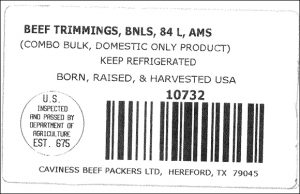Caviness Beef Packers, a Hereford, Texas establishment, is recalling approximately 2,100 pounds of boneless beef trim products that may be contaminated with E. coli O103, the U.S. Department of Agriculture’s Food Safety and Inspection Service (FSIS) announced today.
 sThe 2,100-lb. Combo Bin of “boneless beef trim 84L” products were produced on September 14, 2016 and further processed into ground beef products by another establishment. The recalling establishment has control of all but 320 pounds of ground beef products.
sThe 2,100-lb. Combo Bin of “boneless beef trim 84L” products were produced on September 14, 2016 and further processed into ground beef products by another establishment. The recalling establishment has control of all but 320 pounds of ground beef products.
10 lb. chub – 73% Regular Ground Beef products with a “Use By” or “Freeze By” date of October 10, 2016 and bear UPC number 52846-48935.
2-3 lb. tray pack of – 73% Regular Ground Beef products with a “Sell By” date of September 28, 2016 and bear UPC number 2-01656-00000.
1.5 lb. tray pack of – 73% Regular Ground Beef products with a “Sell By” date of September 28, 2016 and bear UPC number 2-01654-00000.
The products subject to this recall were further processed by a firm other than Caviness Beef Packers, “EST. 675” and may not bear the establishment number “EST. 675”, on products available for direct consumer purchase. These products were shipped to retail locations in Texas.
The problem was discovered when FSIS was notified of a USDA’s Agricultural Marketing Service (AMS) sample that tested positive for E. coli O103. Because the company works with the AMS Commodity Program, AMS did routine microbiological testing. This shipment of beef was never intended for the National School Lunch Program (NLSP) and no sales were made to the NLSP. There have been no confirmed reports of adverse reactions due to consumption of these products.
Many clinical laboratories do not test for non-O157 Shiga toxin-producing E. coli (STEC), such as STEC O103 because it is harder to identify than STEC O157. People can become ill from STECs 2–8 days (average of 3–4 days) after consuming the organism. Most people infected with STEC O103 develop diarrhea (often bloody), and vomiting. Some illnesses last longer and can be more severe. Infection is usually diagnosed by testing of a stool sample. Vigorous rehydration and other supportive care is the usual treatment; antibiotic treatment is generally not recommended.
